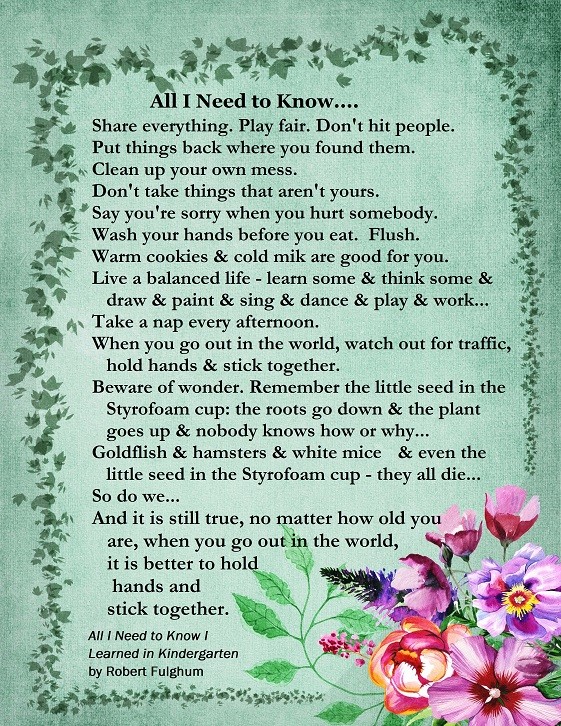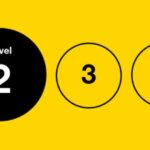Robert Fulghum’s beloved collection of essays, All I Really Need to Know I Learned in Kindergarten, published over 25 years ago, continues to resonate deeply with readers worldwide. The simple yet profound truths within this book offer a timeless guide to living a fulfilling and meaningful life. I first encountered Fulghum’s insightful words at a conference years ago, and they left such an impression that I created a laminated sheet of his essay to keep on my refrigerator as a constant reminder.
Revisiting these principles regularly, I am always struck by their enduring wisdom. As we approach the year’s end, a time often associated with reflection and resolutions, it’s an opportune moment to contemplate these fundamental truths. Imagine the positive impact on our families, communities, and the world if we all embraced these kindergarten lessons: cleaning up our own messes, living balanced lives, and supporting one another.
You can still access the 2015 printable version of this inspiring essay for personal use:
The Core Wisdom: Kindergarten Lessons for a Better Life
Fulghum eloquently states the essence of his message:
“All I really need to know about how to live and what to do and how to be I learned in kindergarten. Wisdom was not at the top of the graduate school mountain, but there in the sand pile at school.”
He then distills this wisdom into a simple yet powerful list of life lessons learned in kindergarten:
- Share everything.
- Play fair.
- Don’t hit people.
- Put things back where you found them.
- Clean up your own mess.
- Don’t take things that aren’t yours.
- Say you’re sorry when you hurt somebody.
- Wash your hands before you eat.
- Flush.
- Warm cookies and cold milk are good for you.
- Live a balanced life – learn some and think some and draw and paint and sing and dance and play and work every day some.
- Take a nap every afternoon.
- When you go out in the world, watch out for traffic, hold hands and stick together.
- Be aware of wonder. Remember the little seed in the Styrofoam cup: the roots go down and the plant goes up and nobody really knows how or why, but we are all like that.
- Goldfish and hamsters and white mice and even the little seed in the Styrofoam cup – they all die. So do we.
- And then remember the Dick-and-Jane books and the first word you learned – the biggest word of all – LOOK.
These seemingly basic instructions actually encompass a profound philosophy for life. From the Golden Rule (“Play fair,” “Don’t hit people”) and the importance of personal responsibility (“Clean up your own mess,” “Put things back where you found them”) to the value of health and wellbeing (“Wash your hands,” “Warm cookies and cold milk”) and community (“Hold hands and stick together”), these kindergarten principles are surprisingly comprehensive.
Fulghum points out that these lessons are not just for children; they are universally applicable. Extending these simple principles to adult contexts – family life, work, government, and global affairs – reveals their enduring relevance. Imagine a world where governments always “put things back where they found them” and “cleaned up their own messes.” The implications are transformative.
Download 8.5 x 11 Printable Version
For those who prefer a larger format, an 11″ x 14″ version is also available for easier reading and display.
Download 11 x 14 Printable Version
These printables are offered for personal enjoyment and reflection. Please respect the author’s work and link back to this page if sharing online.
Enduring Truths for Everyone
The closing thought of Fulghum’s essay is a powerful reminder: “And it is still true, no matter how old you are, when you go out in the world, it is best to hold hands and stick together.” This simple image of unity and mutual support is as vital in adulthood as it is in childhood.
Robert Fulghum’s All I Really Need to Know I Learned in Kindergarten serves as a timeless reminder that the most profound wisdom is often found in the simplest of principles. By embracing these kindergarten lessons, we can cultivate more balanced, responsible, and compassionate lives, contributing to a better world for all.
Explore more of Robert Fulghum’s work on his website: Robert Fulghum or consider purchasing his book:
[

